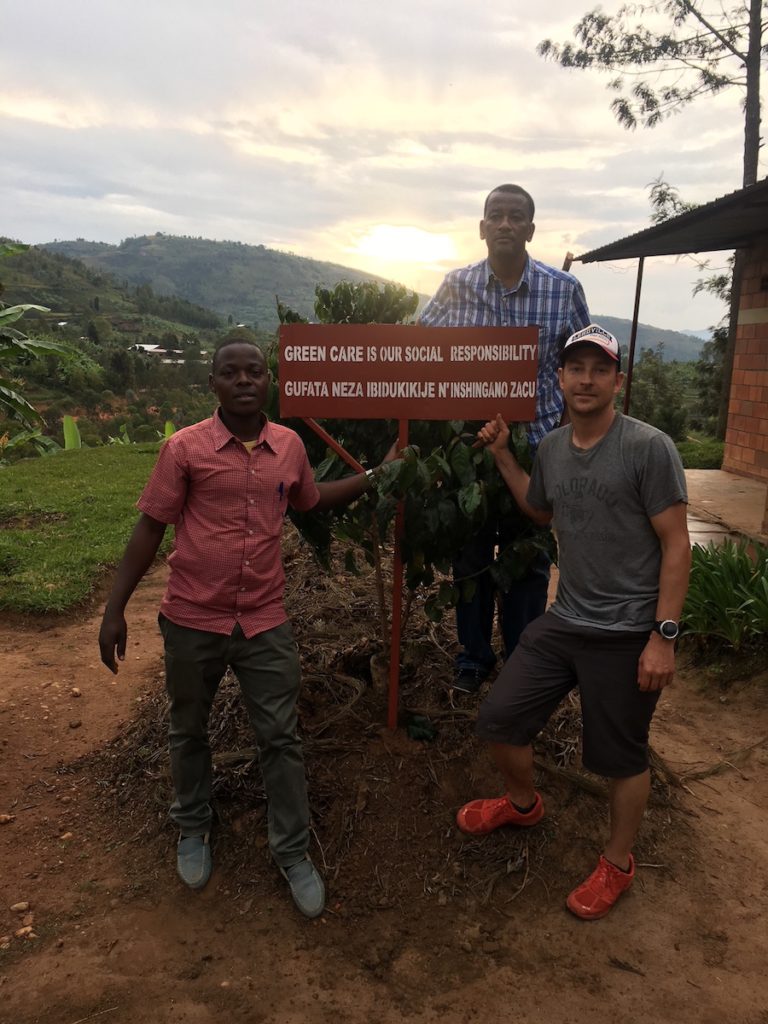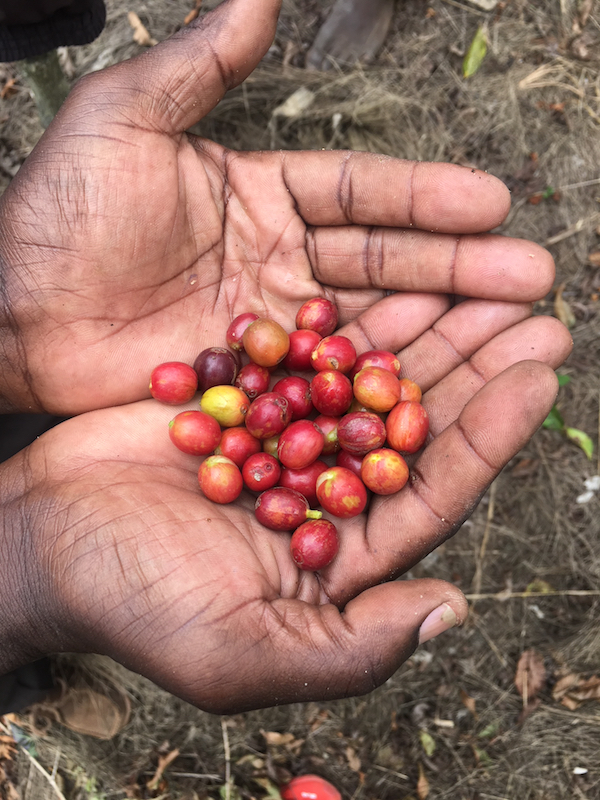Maui Wowi customers know the company well for the thirst-quenching combination of delicious fruit smoothies and coffee that it offers. But few people know the story behind the brews that make the coffee franchise run.
The company has a valuable relationship with a mid-sized roaster called Coda Coffee. The relationship not only produces some of the best-tasting Hawaiian coffee on the market, it allows Maui Wowi franchisees to contribute to the world economy in a sustainable and ethical way.
Meet Tommy Thwaites, cofounder of Coda Coffee. He took us straight to the source, where the farmers actually grow the coffee beans, to explain why Maui Wowi’s coffee is superior to its competitors.
 How are Maui Wowi beans different from competitor’s products?
How are Maui Wowi beans different from competitor’s products?
There are two main things that make Maui Wowi’s coffee really unique from others in the marketplace. The first thing is the Hawaiian component. All blends have some Hawaiian coffee in them, which ties it back to the Maui Wowi theme.
Hawaiian coffees are very expensive. They’re typically 10 times what some other competing coffees might cost around the world. So, we do blends. Hawaiian components are a small piece unless it’s Maui Wowi’s 100% Kona, and they have a 100% Hawaiian, which is a blend from several of the islands.
Coffee really only grows between the Tropic of Cancer and Capricorn. Hawaii’s growing region lies just south of that. Coffee needs to be very tropical or temperate to grow. It can’t freeze at all, or you’ll lose crops. Hawaii is unique in that it doesn’t freeze, they have great weather, they have really rich volcanic soil, which lends to the quality of the product.
The other nice thing about Hawaiian coffee is the farmers. The Hawaiian Coffee Association has banded together for decades and done really well marketing the product and holding each other accountable. If they’re going to dump marketing dollars into pushing their product into the market at a high dollar rate, they want to make sure that everyone growing on the island is at a certain standard, and they’ve done a good job of keeping that quality up.
The other thing is a lot of people know Hawaiian coffee because coffee is associated with an experience. It’s not just is this coffee good or bad, it’s where did I have it? What went along with enjoying this cup of coffee? Typically, when we’re in Hawaii we’re on vacation, a honeymoon or doing something really fun.
A lot of people will travel somewhere, then come back and say, ‘man, I had no idea Hawaiian coffee was so good. I love it. I bought it right off this guy on the side of the road. They roasted it right there, and it was amazing!’ It’s like okay, it was probably good coffee, but it was the experience that made it so much better.
Hawaii carries those connotations to us, especially as Americans. It’s our tropical paradise, and we have that association with the coffee. The farmers have really done a good job of adhering to what’s marketed about Hawaii not only in the coffee world, but as a tropical paradise. Maui Wowi having that piece is really important. It’s the signature component to what they do in coffee.
The other piece that’s important to tell – and we don’t get to tell it very often – is what we do as a roaster sourcing the majority of that blend. We’ll use anywhere from three to five different coffees in a blend that come from somewhere else in the world. They may come from a third world area that’s typically a lot less privileged than what you’re going to find in Hawaii. It’s people with dirt floors in their homes, still using wood fire ovens to cook on. It’s 11 hours in the back of a van on a bumpy dirt road to get out to these farms and the people.
For us sourcing sustainably and ethically for the rest of that blend is super important. My brother Tim and I travel quite a bit to work with these farmers. We want to know where this coffee comes from, what is their story, how we can help them, and how we can give back to their communities. We’ve established some pretty strong relationships. We’ve had our business for about 13 years now, and we do this for all of our Coda branded coffees.
How does building the coffee blend work exactly?
We buy a lot of coffees from coops. Coop meaning a village or community, maybe 250 family farms. Farm is a loose term. Don’t think large ranch or rows of agriculture. Think one acre, two acres, five acres being a relatively large parcel of land.
These 250 families in a community will come together as a coop, like this one we’ve been using for quite a while, Las Cupacas in Honduras. They blend their coffee together because one family’s production is not enough to export. When we go to Las Cupacas, we sit and grade a bunch of their coffees. Over three or four days we’ll cup and taste – cupping is a method we use to analysis coffee samples – and we’ll look at maybe 150 different coffees.
We look at those blind and rate them as a standalone coffee but also against each other. Then we’ll say, ‘coffee sample’ – and this is just arbitrary – ‘7, 21 and 85 were exceptional. What did those farmers do different than the rest of the coop? Let’s get that information to everybody so the quality goes up.’ Therefore, you get more money for the product, and you improve their livelihood.
We always do some sort of donation: improve a school, donate sports equipment, we built a kitchen in a cafeteria, we’ve helped them with production equipment. We like to give back, but the most important thing for us to do is to help them produce better coffee so that its sustainable long term. If they’re not producing good coffee, and it’s not exportable, they’re not going to get premium for it. We go around the world working on those projects, and that’s the other big piece that goes into Maui Wowi blends.
Do many companies go that extra mile to create these sustainable situations and create unique coffee blends?
There are some, but most of them are smaller companies. You don’t see a lot of the larger companies being that hands on. Maui Wowi is a larger franchise company. Typically you find companies like that buying from the big, industrial roasters. We’re still considered a mid-sized roaster. We have flexibility. We’re not so concerned about the bottom line. We’re one of the only certified B Corps, or benefit corporations, in the coffee world. So, in the actual bylaws of our business we say that we have to be profitable, but also what can we do for the people and the planet? That’s how we run our business.
How did the relationship with Maui Wowi start?
We’ve been working together for about 11 years. They were looking to get into more of the espresso side, and they rented a machine for their corporate headquarters. They asked the company they rented the machine from, do you know anyone who can train us on this? Our business was a rep for that company, and they said, try the Coda guys; they might be able to help you.
I remember setting up the machine, and they came in, got the training and went on. But then we started communicating with them. Like, hey, what are you guys trying to do here? It took us about another year to show them that we could really elevate their coffee program and take them to the next level both from an espresso stand point for fixed retail locations, and from a story and education standpoint on the Ka’anapali carts and kiosks. Their business has grown, and ours has grown significantly too. The relationship has blossomed pretty well.
 How has that relationship affected the products that franchisees sell?
How has that relationship affected the products that franchisees sell?
We’ve definitely improved quality quite a bit. We’ve also done roadshows inside of their network. We do a lot of outreach education, we do seminars at their annual conference as well. The franchisees are a lot more educated on coffee than they were, and we’re supporting that with a better product.
What more can you tell us about Maui Wowi?
They’re a fun company to work with. They’re good people, easy going. About two years ago they were acquired by Kahala Brands, and as a mid-sized company you’re always concerned when a larger company like that moves under an umbrella. But it was actually great from our standpoint. They’ve been great partners. They gave us a really fair shot to keep the business. Any time you buy a business they’re going to put in their own systems, but they interviewed us, and we were able to stay with Maui. We’ve actually moved into other lines with Kahala, so that’s been a very positive thing. I like how they run their business. They’re good people.
To learn more about how you can run a Maui Wowi coffee franchise, click here.
©2018 Kahala Franchising, L.L.C. All rights reserved. All other trademarks referenced are property of their respective owners. The information provided herein is for informational purposes only and is not intended as an offer to sell, or the solicitation of an offer to buy, a franchise; nor is it directed to the residents of any particular jurisdiction within the U.S. or elsewhere. The following states currently regulate the offer and sale of franchises: CA, HI, IL, IN, MD, MI, MN, NY, ND, RI, SD, VA, WA, and WI. If you are a resident of one of these states, or of a jurisdiction that has similar requirements, we will not offer you a franchise until we have completed the applicable registration or obtained the exemption from registration, and completed the applicable disclosure requirements. Regardless of what state you reside in, an offering can only be made by a franchise disclosure document.

